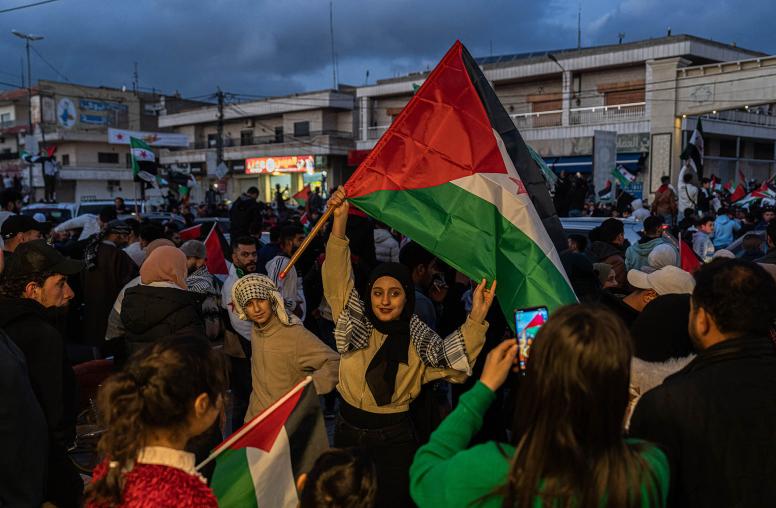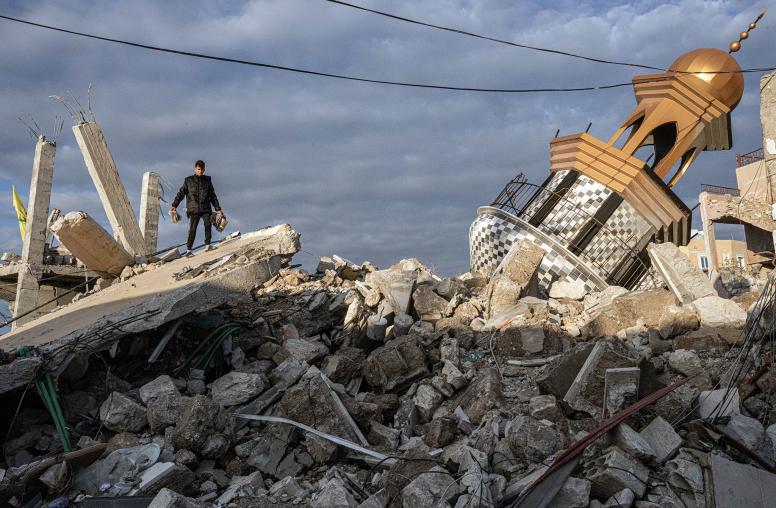Amid Historic Crisis, Has a New Hope Emerged in Lebanon?
The road to political reform and economic recovery in Lebanon is long, but the results of the May elections could offer a head start.
As Lebanon suffers from an historic economic crisis propelled by the venality of its political establishment, the May 15 elections have injected a glimmer of hope amid gloomy prospects for the future. Thirteen independent candidates — part of what is dubbed the “change opposition” — won seats in the 128-member Parliament. “The election of these 13 MPs [members of Parliament] is a very important, gradual first step toward more peaceful political change and reform in Lebanon,” said Mona Yacoubian, a Lebanon expert and senior advisor for the U.S. Institute of Peace. But the road ahead is fraught with internal challenges and external forces that could impede Lebanon’s much-needed reform.

Lebanon analysts, speaking to a USIP audience, agreed that this is a moment for cautious optimism. “The results of these elections have given new hope to civil society groups and a population which on the eve of elections had almost given up hope,” said Paul Salem, the Middle East Institute’s president.
Still, this hope should be tempered by the severity of the crises facing the country and the structural impediments to reform. “The institutional barriers to significant change still exist,” said David Schenker, who directs the Arab Politics program at the Washington Institute for Near East Policy. “So, I’m not particularly optimistic about the prospects for broad change.”
Lebanon’s Economic Collapse
The May election was the first since mass protests swept the country in 2019, when Lebanese took to the streets to demand change during an economic crisis — which has only deepened since — and the failure of Lebanon’s leaders to meaningfully address the challenges besetting the tiny Mediterranean nation.
The devastating 2020 Port of Beirut explosion that killed over 200 and damaged much of the capital city’s infrastructure highlighted Lebanon’s governance dysfunction. The blast led Lebanon’s economic situation “to go from bad to worse,” noted Ambassador Hesham Youssef, a former Egyptian diplomat and USIP senior fellow, who moderated the discussion.
According to the World Bank, Lebanon is facing one of the world’s worst economic and financial crises in the last 150 years. The bank reports that real GDP declined by 10.5% in 2021, following 2020’s 21.4% drop. Overall, Lebanon’s economy has contracted by nearly 60% since 2019, which accounts for the biggest contraction of 193 countries measured during that time. The Lebanese lira has declined in value by 90% in the last two years and poverty is soaring.
In the fall of 2021 — before the Ukraine crisis exacerbated problems with global food supply chains — the United Nations estimated that a quarter of Lebanon’s population struggled with food insecurity. Estimates now suggest that 75% of the population is struggling to put food on the table.
“We’ve seen the Lebanese middle class essentially vanish before our eyes,” said Yacoubian.
The World Bank has deemed Lebanon’s economic collapse a “deliberate depression,” because of “continuous policy inaction” and “persistent and debilitating internal political discord.”
Legacies Die Hard in Lebanon
Modern Lebanese politics have centered on sectarianism. Top leadership positions are divided among the country’s major religious sects: the speaker of Parliament is reserved for Shia Muslims, the premiership for Sunni Muslims and the presidency for Christians. This has fostered a corrupt, patronage-based political system in Lebanon, with political parties focused on providing services and jobs to their sectarian base. Historically, crises in Lebanon have led “citizens … to turn to the traditional ruling establishment and their clientelist and patronage networks for the provision of needs, ensuring the political establishment’s survival,” Osama Gharizi, a senior advisor at USIP, wrote shortly after the elections.
One reason some observers find hope in the election results is that Hezbollah and its allies lost their parliamentary majority. Hezbollah, a powerful Shia militia-cum-political party, has been an impediment to change — for example, they have sought to block inquiries into the Port of Beirut explosion — and source of foreign influence in Lebanon, as it is heavily backed by Iran and largely viewed as its proxy. With an electoral system designed to favor Lebanon’s powerholders, independents winnings 10% of the seats in parliament is “no joke,” said Salem.
Still, traditional parties hold 99 seats in parliament and will likely continue to dominate Lebanon’s politics. “Hezbollah still exists and, along with its allies in the country, are not known for their support for reform,” said Schenker. One example of the staying power of the old guard is Nabih Berri, who leads the Shia Amal party that is closely allied with Hezbollah. Berri has been re-elected as speaker of parliament, a position he’s held since 1992.
Now What?
Major challenges lie ahead for the newly elected parliament, which must form a cabinet and elect a new president but has no clear majority bloc. “There’s a good chance we are headed into a period of gridlock with incredible difficulties ahead, “ Yacoubian said.
Lebanese authorities and the International Monetary Fund agreed in April on a reform plan to rebuild the economy and strengthen governance and transparency. This will require the traditional political parties to overcome their old ways of doing business in order to tackle the key reform pillars needed to secure IMF funds.
Can the independent parliamentarians help make this happen?
Questions remain over the ability of the independent parliamentarians to coalesce and effectively push for reform. “Even as you characterize [independent parliamentarians] as reformed oriented, they are not necessarily unified,” said Schenker.
While the moment remains fraught for Lebanon, an important victory has been won. “One of the real takeaways from the so-called Arab Spring was the inability of Arabs demanding change to translate street protests and demonstrations into viable political action with real resonance. And we’ve seen that in Lebanon,” Yacoubian said.
Regional and Global Developments Impact Lebanon
Regional developments and alignments will play a major role in Lebanon’s trajectory. Russia’s need to divert attention and resources to the frontline with Ukraine could lead to destabilization in Lebanon’s neighbor Syria, where Moscow has played a central role in propping up the Assad regime. Syria’s civil war has already had major ramifications for Lebanon and further destabilization could lead to more refugee flows and economic pain. Lebanon already hosts the largest number of refugees per capita in the world.
Iran has also helped the Assad regime maintain its grip on power, spreading Tehran’s already considerable influence in the Levant, and will likely look to fill a void left by Moscow. This would mean a larger and more potent Iranian threat directly north of Israel, and the increased possibility of direct confrontation. “We’re seeing dramatically increased tension along the border,” Schenker said.
The outcome of the faltering negotiations on a return to the Iran nuclear deal, also known as the Joint Comprehensive Plan of Action (JCPOA), will also be important to watch. “If there is a return to the JCPOA, it is possible that some backdoor diplomacy … could nudge [Lebanon] forward in terms of reform” Salem said. He noted that in the past, regional diplomatic breakthroughs enabled positive developments in Lebanon.
Two competing regional trends will have major implications for Lebanon, Yacoubian said. On some issues, there is a dynamic of de-escalation, evidenced by Israel’s normalization with Gulf States, efforts by Saudi Arabia and Iran to reduce tensions, and the UAE’s and Bahrain’s willingness to engage with Assad. Yet, in other ways, there is a dynamic of escalation. Israel and Iran tensions are as fraught as ever and threaten to embroil the region in conflict. Lebanon has long been a theater for proxy wars and these developments will undoubtedly impact its trajectory, for good or ill.
Meanwhile, the war in Ukraine is further stressing Lebanon’s humanitarian crisis. In 2020, 80% of Lebanon’s wheat imports came from Ukraine and the Port of Beirut explosion severely damaged grain silos that held 85% of the country’s reserves. The beleaguered nation will need stepped up assistance as the global food crisis deepens.
What Is the United States Doing to Help?
As Lebanon deals with its numerous crises, the United States has provided nearly $510 million in assistance since October 2020. Washington is already the biggest foreign donor to Lebanon, but it should continue to provide much-needed support. “[The United States] didn’t cause this financial collapse … this was made by Lebanon, but the United States should help feed the Lebanese people,” Schenker said.
Another pillar of U.S. support for Lebanon is Washington’s assistance to the Lebanese Armed Forces (LAF), which plays an important role in safeguarding Lebanese sovereignty in the face of Hezbollah’s own military forces. “They remain the backbone of Lebanese stability … and a lot of that is due to strong and continued U.S. support,” Salem said.
What else can Washington do? The United States “need[s] to step up [its] game with respect to political assistance and democracy promotion,” said Yacoubian, who called for parliamentary training to help the new independent members of Parliament.
Moving forward, U.S. diplomacy will also be key. “In the next six months, Lebanon needs intensive diplomacy with U.S. engagement or leadership to make sure that we reach the end of the year … with an effective government that can respond to the needs of the people,” Salem said. Part of this diplomacy should be to push for the formation of a government that can put sectarian partisanship aside and start to address Lebanon’s massive challenges. Washington should “put a lot of pressure on the political powers in Lebanon to form a technocratic government as soon as possible,” Yacoubian said. “The magnitude and severity of the challenge is so significant that we can’t wait for the typical Lebanese horse trading … to play out.”
Of course, Hezbollah could stymy that effort. But then they will face a choice: Hezbollah can either support a reform process that improves the lives of their Shia constituents and all Lebanese or watch their country continue to spiral toward collapse.



